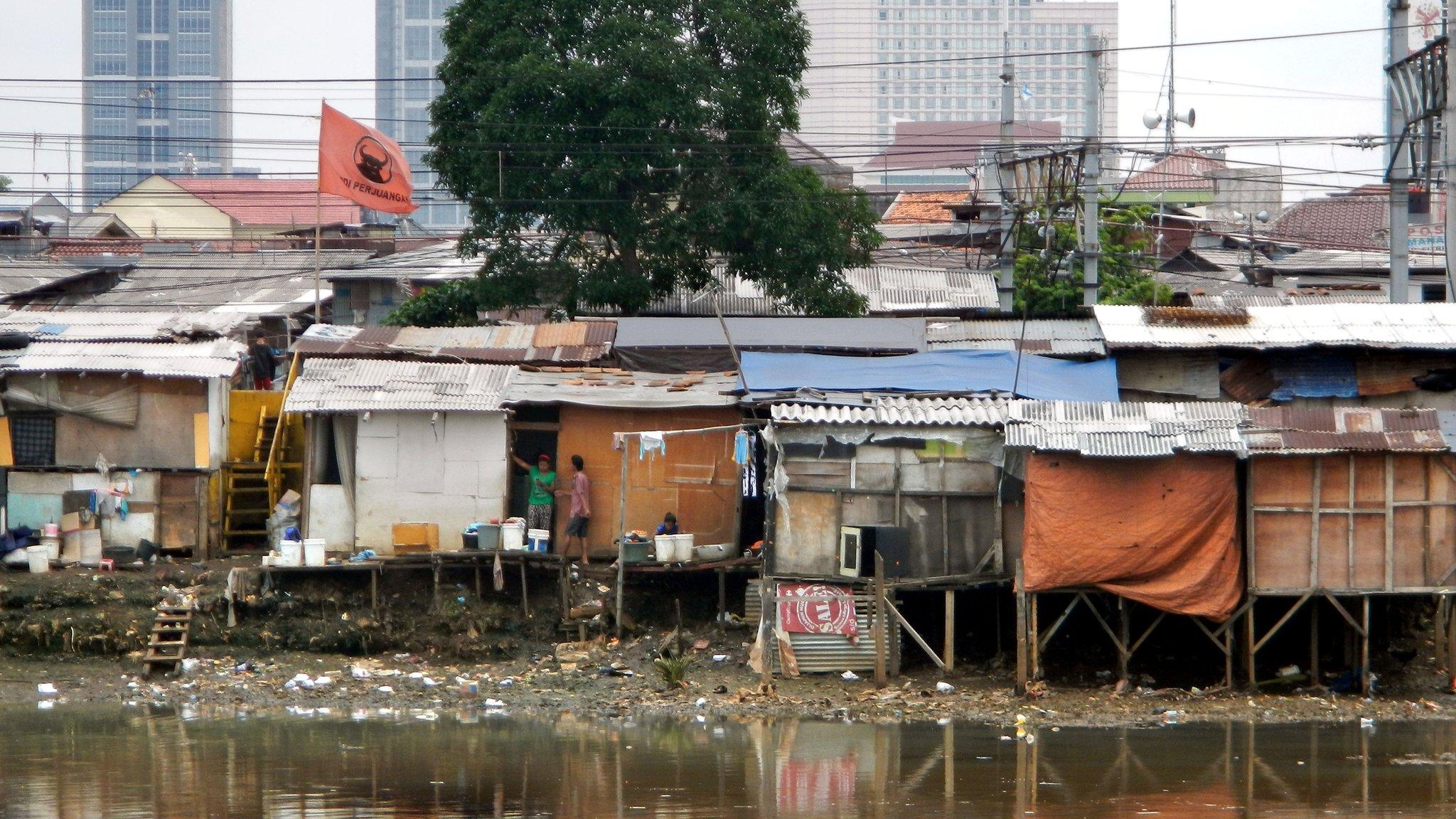What does Jokowi win mean for Indonesia?
- Published
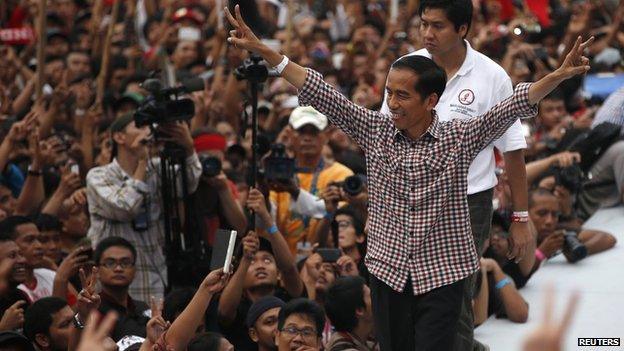
Mr Widodo was elected with huge support from Indonesia's urban and rural poor
After a heated election, Joko Widodo has been declared president of the world's third-largest democracy. But what does a Jokowi presidency mean for Indonesia, asks Indonesia Editor Karishma Vaswani.
I first met Joko Widodo, or Jokowi as he is popularly known here, in one of Jakarta's rare green parks.
Despite the fact that his face had been all over the news - he had recently been elected as Jakarta governor, surprising the political elite with his astounding victory and the support he had gained from Jakarta's masses and the middle class - initially nobody realised it was him wandering around the benches and wide boulevards so casually.
That's because in his trademark Javanese style, Mr Widodo was quietly observing a street orchestra, enjoying the music without any security, pomp or fanfare. Dressed in a simple white linen shirt, black trousers and leather sandals, he looked just like everyone else.
Many say it is his quintessential "man of the people" image that helped him get elected.
"If nothing else, that will be the single most important achievement of his presidency," said Dharsono Hartono, an Indonesian businessman and Jokowi supporter. "He's made it possible for us to say to our kids - look at Jokowi - he used to sell furniture and grew up near a slum - and now he's our president. Now anyone can be president."
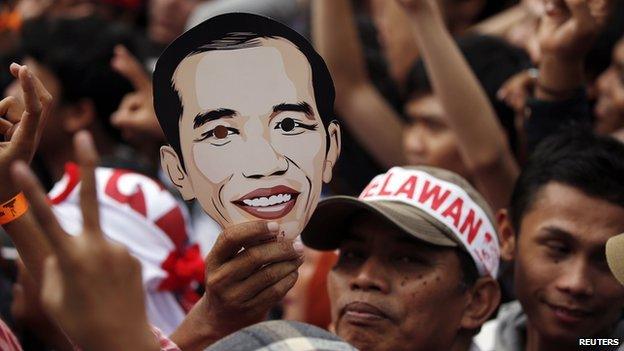
Supporters of Mr Widodo came out in force to cast their ballots
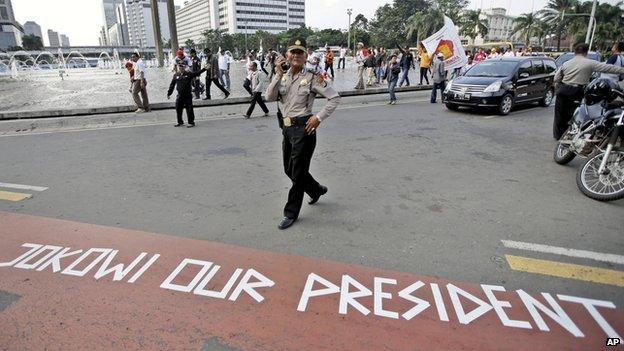
The poll, which took place across hundreds of islands, ended up as a tight race
It's not an achievement to be taken lightly. Only members of the political and military elite have been elected as presidents in this country. Mr Widodo is the first leader from outside the establishment to be elected to the highest office in the land.
But even though his presidency has been lauded by Indonesians and foreign governments alike, it's unlikely that his term in office will be without hurdles.
The first came hours before the formal election announcement when his rival Prabowo Subianto rejected the results, alleging fraud, and promised to challenge them.
"Don't expect the Jokowi presidency to be smooth," said Dr Marcus Mietzner, Associate Professor with the Australian National University. "He will not be the messiah that some people have made him out to be. He will also most probably not be a great president; Jokowi will have trouble relating his style of governance on the ground to the national level. No one has tried what he is doing before."
Dr Mietzner is referring to the informal, town mayor-style of governance that Jokowi perfected as the head of Solo, a small Indonesian city. It was there that he shot to prominence, wowing about 500,000 residents with his promises to clamp down on corruption and eliminate bureaucracy.
And it's precisely because of those promises that Mr Widodo has won so many fans across the country. His random spot checks on government offices and his "blusukans" (unannounced visits to slum areas) have made him a hero amongst Indonesia's poor.
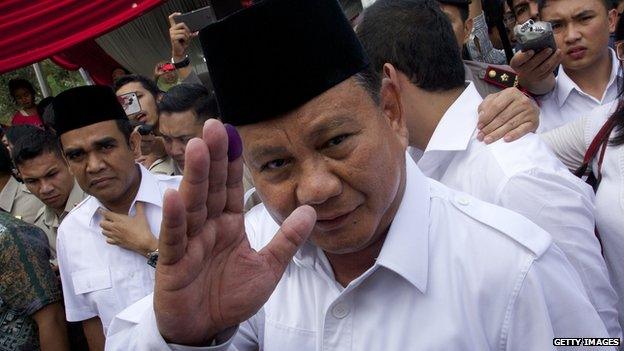
Mr Subianto, a former military general, faced questions about his past under Suharto
"He is a good man," said Ngaitirin, a 45-year-old man who voted for Mr Widodo in the presidential elections. "He works hard and he tries to do good for the people. He is one of us."
But while the support of the people may be crucial in winning in an election, it won't be of much use to the new president when he tries to win over a hostile parliament.
"Jokowi is going to face internal challenges in the coalition," Dr Mietzner said.
"Former President Susilo Bambang Yudhoyono held a 70% majority in parliament and it didn't help him at all. Mr Widodo will try to engage parliament directly rather than building coalitions beforehand but that will be a challenge."
That's because Mr Widodo's coalition of parties currently holds about a third of the seats in the Indonesian parliament, in comparison to his rival Prabowo Subianto's coalition which has around two thirds of the seats.
Economic challenges
High on the list of Mr Widodo's priorities will be to handle Indonesia's economy - South East Asia's largest - and to tackle the politically-sensitive issue of fuel subsidies. Indonesia spends around $20bn (£11.7bn) every year subsidising fuel for its citizens, making its petrol amongst the cheapest in the world.
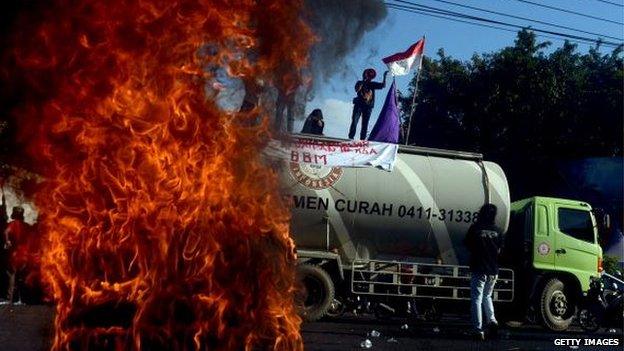
Thousands of demonstrators protested last year against plans to raise the price of fuel
During his campaign, Mr Widodo had promised to phase out these subsidies but that's not going to be easy. Similar efforts by previous presidents have proved messy and chaotic, resulting in nationwide street protests. Mr Widodo will need all the love and support of those who elected him into power if he is to carry out these challenging but critical reforms for his country.
Mr Widodo will also have to steer a slowing economy back to good health. Indonesia has been suffering from the end of the commodity boom - which means that it's no longer making as much money as it did when coal prices were sky high.
He's also got to reach out to foreign investors to help rebuild confidence in South East Asia's largest economy, without aggravating his local supporters who believe that Indonesia's assets have been sold to overseas buyers for a pittance.
The key to his success will be his cabinet. It's not clear yet what kind of men and women will form his new government, but judging from his appointments when he was Jakarta governor, ministers will get posts based on their track record - and not political affiliations.
That makes for an entirely new style of governance in Indonesia - one that many members of the business and political elite may have difficulty getting used to.
Back at the park, the group of fans around Mr Widodo grew larger and larger. He flashed his unassuming smile and high-fived some of the kids - including my toddler.
There's no denying that Jokowi is a hero for many Indonesians who see him as the panacea to all their ills. His biggest challenge, however, will be living up to those expectations.
- Published17 July 2014
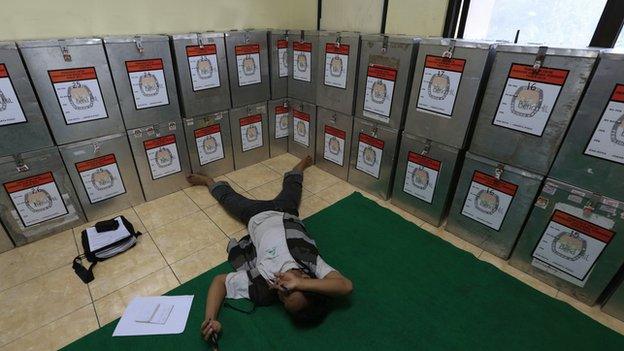
- Published9 July 2014
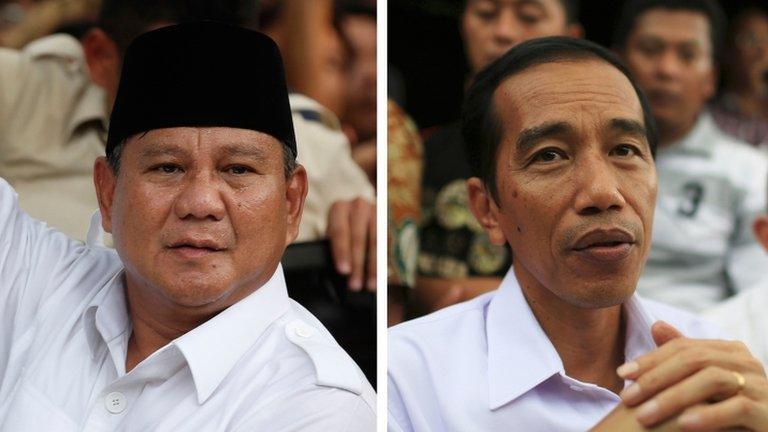
- Published9 July 2014
- Published5 May 2014
